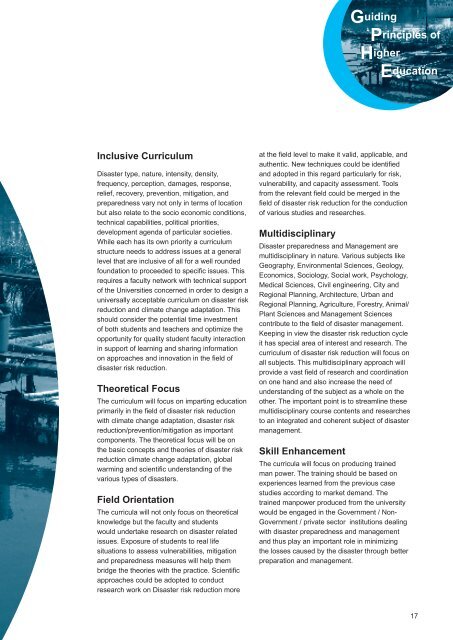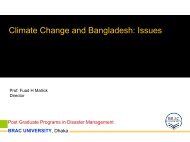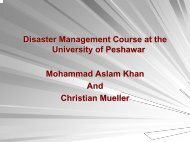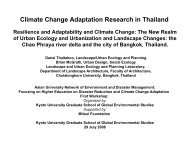Higher Education in Disaster Risk Reduction - auedm
Higher Education in Disaster Risk Reduction - auedm
Higher Education in Disaster Risk Reduction - auedm
Create successful ePaper yourself
Turn your PDF publications into a flip-book with our unique Google optimized e-Paper software.
Inclusive Curriculum<br />
<strong>Disaster</strong> type, nature, <strong>in</strong>tensity, density,<br />
frequency, perception, damages, response,<br />
relief, recovery, prevention, mitigation, and<br />
preparedness vary not only <strong>in</strong> terms of location<br />
but also relate to the socio economic conditions,<br />
technical capabilities, political priorities,<br />
development agenda of particular societies.<br />
While each has its own priority a curriculum<br />
structure needs to address issues at a general<br />
level that are <strong>in</strong>clusive of all for a well rounded<br />
foundation to proceeded to specific issues. This<br />
requires a faculty network with technical support<br />
of the Universities concerned <strong>in</strong> order to design a<br />
universally acceptable curriculum on disaster risk<br />
reduction and climate change adaptation. This<br />
should consider the potential time <strong>in</strong>vestment<br />
of both students and teachers and optimize the<br />
opportunity for quality student faculty <strong>in</strong>teraction<br />
<strong>in</strong> support of learn<strong>in</strong>g and shar<strong>in</strong>g <strong>in</strong>formation<br />
on approaches and <strong>in</strong>novation <strong>in</strong> the field of<br />
disaster risk reduction.<br />
Theoretical Focus<br />
The curriculum will focus on impart<strong>in</strong>g education<br />
primarily <strong>in</strong> the field of disaster risk reduction<br />
with climate change adaptation, disaster risk<br />
reduction/prevention/mitigation as important<br />
components. The theoretical focus will be on<br />
the basic concepts and theories of disaster risk<br />
reduction climate change adaptation, global<br />
warm<strong>in</strong>g and scientific understand<strong>in</strong>g of the<br />
various types of disasters.<br />
Field Orientation<br />
The curricula will not only focus on theoretical<br />
knowledge but the faculty and students<br />
would undertake research on disaster related<br />
issues. Exposure of students to real life<br />
situations to assess vulnerabilities, mitigation<br />
and preparedness measures will help them<br />
bridge the theories with the practice. Scientific<br />
approaches could be adopted to conduct<br />
research work on <strong>Disaster</strong> risk reduction more<br />
at the field level to make it valid, applicable, and<br />
authentic. New techniques could be identified<br />
and adopted <strong>in</strong> this regard particularly for risk,<br />
vulnerability, and capacity assessment. Tools<br />
from the relevant field could be merged <strong>in</strong> the<br />
field of disaster risk reduction for the conduction<br />
of various studies and researches.<br />
Multidiscipl<strong>in</strong>ary<br />
<strong>Disaster</strong> preparedness and Management are<br />
multidiscipl<strong>in</strong>ary <strong>in</strong> nature. Various subjects like<br />
Geography, Environmental Sciences, Geology,<br />
Economics, Sociology, Social work, Psychology,<br />
Medical Sciences, Civil eng<strong>in</strong>eer<strong>in</strong>g, City and<br />
Regional Plann<strong>in</strong>g, Architecture, Urban and<br />
Regional Plann<strong>in</strong>g, Agriculture, Forestry, Animal/<br />
Plant Sciences and Management Sciences<br />
contribute to the field of disaster management.<br />
Keep<strong>in</strong>g <strong>in</strong> view the disaster risk reduction cycle<br />
it has special area of <strong>in</strong>terest and research. The<br />
curriculum of disaster risk reduction will focus on<br />
all subjects. This multidiscipl<strong>in</strong>ary approach will<br />
provide a vast field of research and coord<strong>in</strong>ation<br />
on one hand and also <strong>in</strong>crease the need of<br />
understand<strong>in</strong>g of the subject as a whole on the<br />
other. The important po<strong>in</strong>t is to streaml<strong>in</strong>e these<br />
multidiscipl<strong>in</strong>ary course contents and researches<br />
to an <strong>in</strong>tegrated and coherent subject of disaster<br />
management.<br />
Skill Enhancement<br />
The curricula will focus on produc<strong>in</strong>g tra<strong>in</strong>ed<br />
man power. The tra<strong>in</strong><strong>in</strong>g should be based on<br />
experiences learned from the previous case<br />
studies accord<strong>in</strong>g to market demand. The<br />
tra<strong>in</strong>ed manpower produced from the university<br />
would be engaged <strong>in</strong> the Government / Non-<br />
Government / private sector <strong>in</strong>stitutions deal<strong>in</strong>g<br />
with disaster preparedness and management<br />
and thus play an important role <strong>in</strong> m<strong>in</strong>imiz<strong>in</strong>g<br />
the losses caused by the disaster through better<br />
preparation and management.<br />
17







